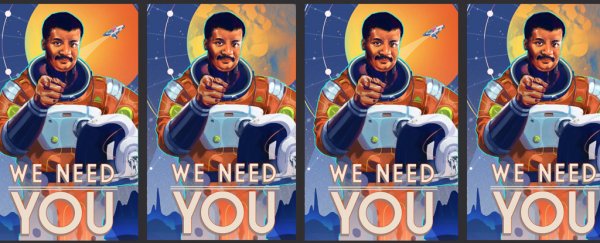Astrophysicist Neil deGrasse Tyson is making a video game about space exploration.
Or trying to, anyway - the Kickstarter for the project went live on June 13 and runs through July 29. At the time of writing, they have raised US$100,121 of the US$314,159 goal (get it?).
The game, called Space Odyssey, would "allow players to travel through the cosmos to scientifically accurate planets, moons and exoplanets based in real science," according to a press release emailed to Business Insider.
Tyson's basic concept seems to be a captivating interactive experience that still follows scientific principles.
"I have no patience for people who say, 'I don't want the laws of physics to constrain me,'" Tyson said while discussing the game at the video game E3 convention in Los Angeles this week.
Space Odyssey
On the Kickstarter page, the team behind the game promises a long list of potential activities: "Develop planets, colonise worlds, nurture species, mine elements, build robots, and discover unique life-forms as you coordinate with others in an intense game of real-time strategy."
Players would supposedly begin by exploring Proxima B, the closest known exoplanet to our own solar system, just over 4 light years away (there are real-life plans to try to send mini-spacecraft there).
After exploring the surface of that planet and learning how the science-based physics systems work (with Tyson as your guide), players would be ready to start the main event.
Beginning at a space station, they'd create and terraform a home planet and system, taking into account real aspects of biology and chemistry. That system can include be colonies and outposts - and you can play solo or with friends.
Players would also need to protect their systems from threats, including environmental disaster, space objects, climate change, disease, and the changes brought about by evolution and whatever else may happen to a planet.
Luckily, a digital assistant with Tyson's soothing voice would guide you through all of this.
Players would also be able to design a spacecraft to explore galaxies created by friends or "prominent scientists and fictional world-builders like Tyson, Bill Nye, George R.R. Martin, Neil Gaiman, and Peter Beagle," according to the Kickstarter.
Plus, there would be bonus virtual reality (VR) missions, playable on an Oculus Rift or Samsung Gear, according to a fact sheet for the game.
The company behind the game is called Space Media Ventures. The team includes producers who have worked in games, movies, and VR; the comics creator behind Wolverine; and artists who have worked on games like God of War 3.
Tyson's role seems to be largely inspiration and helping ensure that the game stays true to real science.
Mark Murphy, a co-creator of the game and creative director at Space Media Ventures, told Digital Trends that Tyson "helped create challenges in the game, and has challenged our creative team to entertain and inspire. He has also brought forward some incredible collaborators to our efforts, an incredible team of scientists, astronauts and explorers."
An ambitious undertaking
Space Odyssey seems to involve building activity similar to Minecraft, space colonisation akin to that in Civilisation: Beyond Earth, elements of exploration like No Man's Sky, and echoes of Elon Musk's favourite rocket-building simulator, Kerbal Space Program. Plus a whole lot of real (and really cool) science.
That's ambitious, especially since the anticipated launch date of Space Odyssey is January 2019.
With all that to design, the Kickstarter funding seems unlikely to be sufficient for the project. But a secondary purpose of the Kickstarter may be to encourage community members to interact with and and influence the game.
"[W]e do have other funding sources for the game; those sources are not contingent on the crowdfund. For us this is a committed community build, we want the people who will be playing our game to have the opportunity to engage while the build is underway," Murphy told Business Insider.
"We are committed to providing an enhanced physics experience which we call experiential physics that will elevate game play regarding modding, mapping and building and expressed action. I think it's fair to say our budget exceeds our community raise goal."
It's hard to say whether everything will really come together by January 2019, but whenever the game gets released, we're excited to play - and learn while doing so.
This article was originally published by Business Insider.



